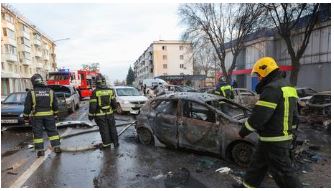
Belgorod
STRATEGIC ASSESSMENT. The strike by Ukrainian forces on Belgorod is the “worst” since the start of the conflict between Moscow and Kiev, Belgorod Region Governor Vyacheslav Gladkov said in a Telegram post. In a separate post in the early hours of Sunday, he added that the death toll has grown to 24.
The shelling also left a total of 108 people injured, the governor wrote on Telegram. The material damage sustained by the city in the strike is still being assessed, Gladkov said, adding that additional public servants from nearby towns had been engaged to speed up this process.
The strike damaged more than 100 vehicles, most of which were “totally destroyed” or burnt, according to Gladkov. A large number of commercial facilities, including shops, stores and malls, were damaged as well, he added. Some gas and water supply systems in the city were also hit, according to the governor.
Gladkov wrote that 30 apartment blocks and several houses were damaged.
The regional authorities decided to cancel all public gatherings and festivities in all territories bordering Ukraine, as well as in the city of Belgorod itself, which is located some 40km away from the border, Gladkov said. The governor also informed President Vladimir Putin and Prime Minister Mikhail Mishustin about the incident and its aftermath.
The Russian Defense Ministry has said that the attack on the city involved the use of cluster munitions. Such weapons comprise dozens of small submunitions that can be scattered over a large area by an initial detonation, which can then also explode, causing a large number of smaller secondary blasts. More than 110 nations banned them under a UN convention in 2008 due to their grave danger to civilians.
According to the ministry, the Ukrainian military equipped the missiles of its Olkha multiple rocket launcher with cluster bomb warheads before firing them at Belgorod. Russian air defense forces managed to intercept most of the projectiles but some still struck the city. Had all of them reached their target, the consequences would have been “immeasurably more severe,” the ministry added.





